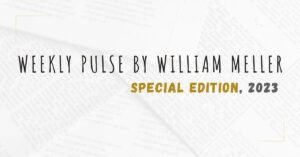The Weekly Pulse is my content curation and my highlights from readings, books, podcasts, insights, and everything I discovered during the week.
So, let’s go with some discoveries from the week!
#1 – When Teams Can’t Decide
#2 – How to Raise an Independent Thinker
#3 – How Apple is Organized for Innovation
#4 – Beyond the Holacracy Hype
#5 – Making Yourself Indispensable
When Teams Can’t Decide
Source: Harvard Business Review
Author: Bob Frisch
Summary: Leadership teams that can’t reach a consensus wait for the CEO to make the final call—and often are disappointed by the outcome. This is the dictator-by-default syndrome. Many companies turn to team-building and communication exercises to try to fix the situation. But that won’t work, the author argues, because the trouble is not with the people, it’s with the decision-making process. Attempting to arrive at a collective preference on the basis of individual opinions is inherently problematic. Once leadership teams realize that voting-system mathematics are the culprit, they can stop wasting time on irrelevant psychological exercises and instead adopt practical measures designed to break the impasse.
3 Highlights:
“… Proposing options early and allowing people to tailor them reduces the likelihood of a stalemate…“
“… It’s essential to keep the discussion of the desired outcome distinct from a discussion about how to achieve it…“
“… When the CEO and the team understand why they have trouble making decisions, they can adopt the following tactics to minimize dysfunction…”
Access full Weekly Pulse reading here >>
How to Raise an Independent Thinker
Source: Shelby Smith Blog
Author: Shelby Smith
Summary: Just like in mentorship, parenting is about teaching kids how to think rather than what to think. And it’s probably the hardest thing a parent will ever do. As adults, we reflect and see there are aspects of the way we were raised that we are incredibly thankful for, and there are aspects which we recognize our parents could’ve done better.
3 Highlights:
“… They will be enlightened and opened up to new ideas they hadn’t considered, leading their belief to evolve…”
“… The parents are cofounding a person…”
“… They will deepen their understanding of this belief, as they will have considered alternative viewpoints…”
Access full Weekly Pulse reading here >>
How Apple is Organized for Innovation
Source: Harvard Business School
Author: Joel M. Podolny and Morten T. Hansen
Summary: When Steve Jobs returned to Apple, in 1997, it had a conventional structure for a company of its size and scope. It was divided into business units, each with its own P&L responsibilities. Believing that conventional management had stifled innovation, Jobs laid off the general managers of all the business units (in a single day), put the entire company under one P&L, and combined the disparate functional departments of the business units into one functional organization. Although such a structure is common for small entrepreneurial firms, Apple—remarkably—retains it today, even though the company is nearly 40 times as large in terms of revenue and far more complex than it was in 1997.
3 Highlights:
“… Apple’s functional organization is rare, if not unique, among very large companies. It flies in the face of the prevailing management theory that companies should be reorganized into divisions and business units as they become large. But something vital gets lost in a shift to business units: the alignment of decision rights with expertise…”
“… The company is organized around functions, and expertise aligns with decision rights. Leaders are cross-functionally collaborative and deeply knowledgeable about details…”
“… A good mess happens when various teams work with a shared purpose… A Bad mess occurs when teams push their own agendas ahead of common goals...”
Access full Weekly Pulse reading here >>
Beyond the Holacracy Hype
Source: Harvard Business Review
Author: Ethan Bernstein, John Bunch, Niko Canner, and Michael Lee
Summary: Adopting self-management wholesale—using it to determine what should be done, who should do it, and how people will be rewarded across an entire enterprise—is hard, uncertain work, and the authors argue that in many environments it won’t pay off and the next generation of self-managing teams is demanding also a new generation of leaders
3 Highlights:
“… Teams are the structure. Within them, individual “roles” are collectively defined and assigned to accomplish the work…”
“… Teams design and govern themselves, while nested within a larger structure…”
“… Leadership is contextual. It’s distributed among roles, not individuals, and responsibilities shift according to fit and as the work changes…”
Access full Weekly Pulse reading here >>
Making Yourself Indispensable
Source: Harvard Business Review
Author: John H. Zenger, Joseph Folkman, and Scott Edinger
Summary: Peter Drucker and other leading thinkers have long argued that leaders should focus on strengthening their strengths. The authors, all from the leadership development consultancy Zenger Folkman, present a step-by-step process by which developing leaders can identify their strengths, select appropriate complementary skills, and develop those skills to dramatically improve their strengths—making themselves uniquely valuable to their companies.
3 Highlights:
“… Strengths can arguably be identified in a variety of ways. But we contend that in the context of effective leadership, your view of your own is less important than other people’s, because leadership is all about your effect on others…”
“… If you are strong technically, becoming even more of a technical expert won’t make you a dramatically better leader…”
“… Executives need a path to enhancing their strengths that are as clear as the one to fix their weaknesses…”
Access full Weekly Pulse reading here >>
Do you want to get new content in your Email?
I am incredibly grateful that you have taken the time to read this Weekly Pulse.
The Weekly Pulse is an important section of this website, aiming to share good stuff with you every week!
Do you want to explore more? Check more Weekly Pulse content here.
Check my main categories of content below:
- Agile
- Blog
- Book Notes
- Career
- Leadership
- Management
- Managing Yourself
- Productivity
- Project Management
- Technology
- Weekly Pulse
Navigate between the many topics covered in this website:
Agile Art Artificial Intelligence Blockchain Books Business Business Tales Career Coaching Communication Creativity Culture Cybersecurity Design DevOps Economy Emotional Intelligence Feedback Flow Focus Gaming Goals GPT Habits Health History Innovation Kanban Leadership Lean Life Managament Management Mentorship Metaverse Metrics Mindset Minimalism Motivation Negotiation Networking Neuroscience NFT Ownership Parenting Planning PMBOK PMI Politics Productivity Products Project Management Projects Pulse Readings Routines Scrum Self-Improvement Self-Management Sleep Startups Strategy Team Building Technology Time Management Volunteering Work
Do you want to check previous Weekly Pulse posts? Check the last couple of weeks:
- Weekly Pulse by William Meller | Special Edition, 2023
- Weekly Pulse by William Meller | Week 51, 2023
- Weekly Pulse by William Meller | Week 50, 2023
- Weekly Pulse by William Meller | Week 49, 2023
- Weekly Pulse by William Meller | Week 48, 2023
Support my work by sharing my content with your network using the sharing buttons below.
Want to show your support tangibly? A virtual coffee is a small but nice way to show your appreciation and give me the extra energy to keep crafting valuable content! Pay me a coffee:





